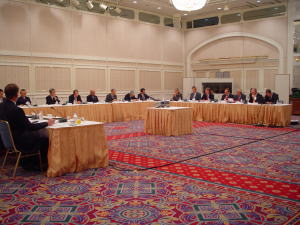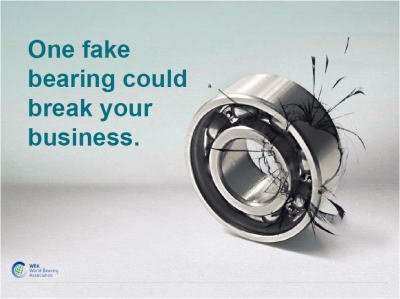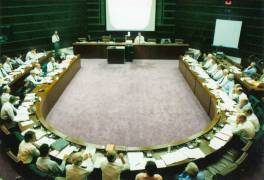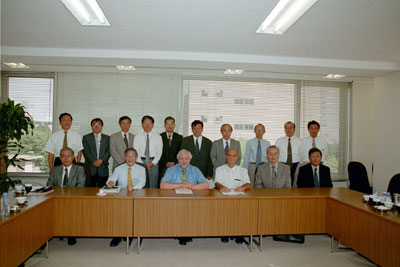Current activities by the JBIA
1) Promotion of international
exchanges
2) Formation of countermeasures for imitation products
3) Pursuit of countermeasures for environmental problems
4) Aggressive promotion of activities toward standardization
1) Promotion of international exchanges
In November 1993, the executives of the three bearing industrial associations
of Europe, America and Japan got together for the first time in Key Largo, Florida, USA, to hold the first Executive Meeting. Ever since then, six more
Executive Meetings have been held, and, starting from the second one, the
participants were engaged in not only preparing statistics but also in lively
discussions regarding other issues of common concern for the three poles such
as environmental problems.
[Past Bearing Industrial Associations Executive Meeting of Europe, USA and Japan]
November 1993 : The 1st Executive Meeting in Key Largo, Florida
March 1999 : The 2nd Executive Meeting in Kyoto, Japan
March 2000 :The 3rd Executive Meeting in Paris, France
May 2001 :The 4th Executive Meeting in Washington DC, USA.
April 2002 :The 5th Executive Meeting in Tokyo, Japan
May 2004 :The 6th Executive Meeting in Rome, Italy
September 2005 :The 7th Executive Meeting in San Francisco, USA
At the 7th meeting held at San Francisco in September 2005, it was proposed to establish the World Bearing Association (WBA) to deal effectively with issues of common concern for the bearing industry in conformity with the related laws and regulations. Consequently in September 2006, the inaugural general assembly of the WBA was held in Kyoto, Japan

WBA inaugural meeting held in Kyoto
[WBA
General Meetings in the past]
September 2006 : The Inaugural Meeting in Kyoto
September 2007: The 2nd
General Meeting in Munich
In
order to publicize the importance of the bearing industry and the fact that a
bearing is a product friendly to the global environment, the WBA issued in May
2005 a brochure, “Bearings and the Environment”.
For the brochure, please see the PDF.
2) Formation of countermeasures for imitation
products
Recently many imitation bearings have appeared in the markets of Asia,
Central and South America and elsewhere, which display either the brand
name of a leading maker or a confusingly similar name. Not only do these
products violate intellectual property laws, they commonly possess inferior
quality and lead to the premature breakdown of the automobiles, electric
appliances and other products in which they are installed and expose consumers
and plant workers to danger. Because it is believed many factories manufacturing
such imitation bearings are located in China, the JBIA has dispatched negotiating
teams to China on four occasions at the end of November 2000, early in
March 2002, early in March 2003, in December 2003 and in October 2004 to
explain to Chinese government authorities the risk of injury or death presented
by imitation bearings and to request that they enact tighter controls in
order to eliminate the manufacture and sale of Chinese-made imitation bearings
New Awareness Campaign Against Product Counterfeiting
In the last two decades, counterfeiting in general has grown by 10,000 percent, globally. While there has been much reporting about consumers being taken advantage of by counterfeits in music, film, home electronics and designer clothing, a far greater risk lies in industrial counterfeiting of items such as tires, seals and bearings. All these products are safety-critical and fake versions pose a real threat.
As a result, the World Bearing Association (WBA) has launched an awareness campaign to inform about safety hazards arising from counterfeit bearings.

3) Pursuit of countermeasures for environmental problems
Increasingly, the world's nations are realizing the importance of resolving
environmental problems. Understanding this trend, the JBIA established
a Global Environmental Committee to lead Japan's bearing industry in this
area. This committee has already established an Environmental Voluntary
Action Plan that includes voluntary targets for Japanese bearing makers,
including global warming countermeasures and industrial waste countermeasures
(shown below), and each year follows up on the progress of bearing makers
toward these targets.
Target for global warming countermeasures: Reduce carbon emissions (unit: tons per bearing production volume) 23% by 2020 in comparison with the 1997 level.
Target for industrial waste countermeasures: By 2020, raise the industrial waste recycling rate to 96% and reduce the waste final disposal amount by 91% in comparison with the 2000 level.
4) Aggressive promotion of activities toward standardization
The JBIA, along with setting and revising the Japanese Industrial Standards (JIS) and Bearing Association Standards (BAS), participates in international standardization activities as the subcommittee studying bearings within the Japan Industrial Standards Committee. Also, the JBIA has contributed aggressively to international standardization over the last 40 years by participating in meetings of the ISO/TC4, the bearing-specialist arm of ISO, beginning with the eighth meeting of this organization, which was held in Torino in 1961. The JBIA hosted the 12th ISO/TC4 meeting, held in Tokyo in 1969, as well as the 20th ISO/TC4 meeting, held in Yokohama in 1995. Some 83 participants from 23 countries participated in this 1995 meeting in Yokoyama, making it the largest ISO/TC4 meeting held until that time in the more than 50-year history of this organization.

20th ISO/TC4 meeting
(held in Yokoyama in 1995)
In regard to standards development with the ISO/TC4, the JBIA submits proposals to this organization on an ongoing basis with the aim of optimizing existing standards, and in recent years it has proposed new standards to the ISO/TC4 and participated in projects for their development. One of these is ISO 15241, which was enacted in 2001 and was developed on the basis of JIS standards under the leadership of Japan. ISO 15241 is an important basic standard that designates quantity codes for rolling bearings. Also, the JBIA is playing a central role in the development of standards for linear bearings, which are becoming an increasingly important field within the bearing industry.

ISO/TC4/SC11/WG1 meeting regarding linear bearings
(held in Tokyo in Sept. 2002)